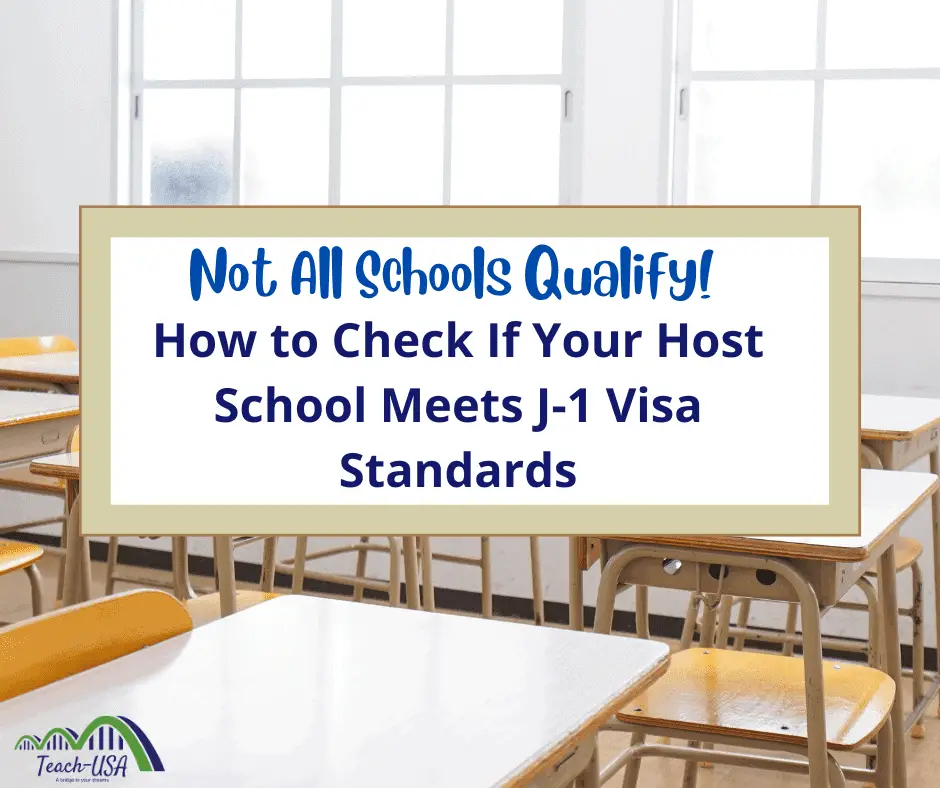If you’re a teacher planning to work in the U.S. under a J-1 visa, it’s important to know that not all schools are eligible to host international teachers. Before signing a contract, you need to ensure that your prospective school meets the J-1 visa sponsor’s requirements.
To help you make an informed decision, here’s a simple guide to understanding J-1 host school eligibility standards and what to look for before accepting an offer.
1. Accreditation: Is the School Officially Recognized?
Your host school must be accredited by:
-A private accrediting agency OR
-The regional accrediting authority, usually the state department of education
Accreditation ensures that the school meets quality education standards and follows government regulations.
2. Student-Teacher Ratio: Will You Have a Manageable Class Size?
A school’s student-to-teacher ratio can affect your workload and teaching experience.
-The U.S. national average is 15.9 students per teacher (National Center for Education Statistics).
-Schools with extremely high student-teacher ratios may not qualify as J-1 visa host schools.
Tip: If possible, ask about class sizes before accepting a job offer.
3. Teacher Support: Will You Get Professional Development & Mentorship?
A good host school provides:
–Professional development opportunities
–Ongoing mentorship for new teachers
–Constructive coaching to help you grow in your career
Red Flag: If a school lacks teacher support programs, it may not be a great fit for J-1 teachers.
4. Niche Rating: What Do Other Teachers & Parents Say?
Schools are often rated on Niche.com, a platform that gathers feedback from students, teachers, and parents.
-Your host school should have a C rating or higher on Niche.
-If a school has no rating or limited feedback, it won’t automatically be disqualified.
Tip: Check Niche.com for real reviews from other educators before making your decision.
5. School Administration: Does the School Provide Fair Compensation & Stability?
A qualified host school must:
-Offer teacher salaries at or above the state average (see National Education Association data)
-Have no recent administrative challenges (e.g., recent layoffs or instability)
-Provide valid workers’ compensation coverage
-Follow all Department of State regulations
Warning: Schools facing financial troubles or frequent leadership changes may not be the best choice for J-1 visa teachers.
6. State Accountability Rating: Is the School Among the Best in the State?
Public schools in the U.S. are rated annually based on performance, test scores, and other key metrics.
-Your host school should be in the upper level of its state’s accountability rating.
-Example: If a state uses a 1 to 5-star rating system, the school must have at least a 3-star rating.
Tip: Ask your recruiter or school administrator for the latest state-issued report card to check the school’s ranking.
Final Thoughts: How to Protect Yourself as a J-1 Visa Teacher
Before signing any contract, do your research. Ask your recruiter or employer for proof that the school meets these standards. If a school does not meet these qualifications, it might not be able to legally host you under a J-1 visa.
✅ Pro Tip: Double-check with your J-1 visa sponsor before making a final decision. They can confirm whether the school is eligible!
By ensuring your host school is fully qualified, you set yourself up for a successful and smooth teaching experience in the U.S.
—
If you want to teach in the US, please email your resume to apply@teach-usa.net.

